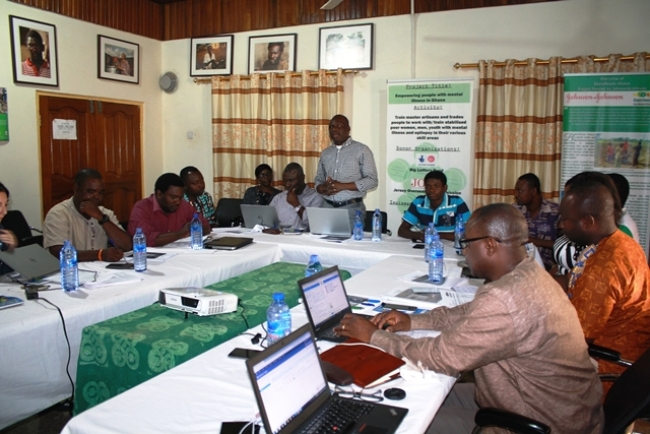Staff of BasicNeeds-Ghana is undergoing a two-day orientation on the protocols of the project titled “Strengthening Mental Health and Research Training (SMART) Africa”. The project, which is a pilot study, is part of a larger collaboration among Ghana, Kenya, South Africa, Uganda and U.S researchers funded by the U.S. National Institute of Mental Health (NIMH).
In Ghana, the study is led by researchers from the University of Ghana in collaboration with BasicNeeds-Ghana. The training facilitators are Dr Fred Ssewamala and Dr Ozge Sensoy Bahar (both from Washington University) and Dr Apollo Kivumbi (SMART Africa Project Director, Uganda). The SMART Africa-Ghana team is comprised of Dr Emmanuel Asampong and Dr Abdallah Ibrahim, both from the School of Public Health, University of Ghana.
Welcoming participants to the workshop, Executive Director of BasicNeeds-Ghana, Yaro Badimak Peter said that the SMART-Africa study is particularly necessary in the Ghanaian context given that it has implications on both health and education of children with disruptive behaviour disorder (DBD). He expressed his belief that an intervention targeted at children at the lower levels of the school structure is particularly necessary in giving a contextualised understanding of the problem of disruptive behaviour among children eight (8) to thirteen (13) years of age.
Dr Emmanuel Asampong from the SMART Africa Ghana Centre said that he was optimistic that the orientation would help to equip the BasicNeeds-Ghana team with the requisite theoretical and ethical underpinnings of the study. He added that the experiences from Uganda would help shape the pilot study in Ghana. Dr Abdallah recounted what processes had led to the day’s training. He recalled the first meeting with BasicNeeds-Ghana during a stakeholder engagement in Accra and how the initial discussions had led the SMART Africa-Ghana team to visit and learn first-hand how BasicNeeds-Ghana worked with the youth.
The study in Ghana is a pilot that seeks to study the phenomenon of disruptive behaviour among children between eight and thirteen years of age. It further aims at developing locally appropriate interventions for tackling the effects of the problem as it affects health and educational outcomes of the children and their parents. As part of preparations, all project staff are expected to undertake and pass designated courses from the Collaborative Institutional Training Initiative (CITI).


